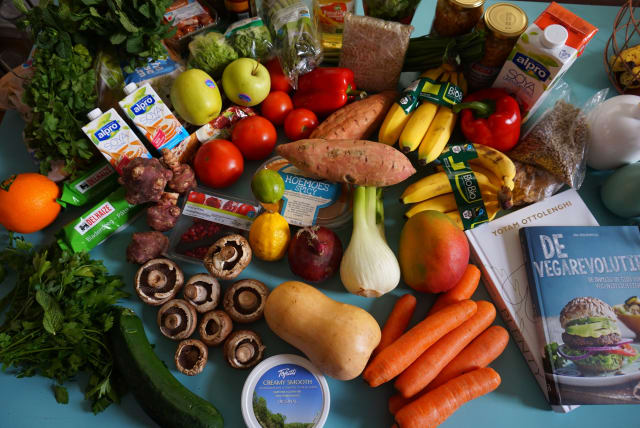Save the cows, chickens, sheep, goats, and fish

Report highlights Israeli approach to food-tech, alt-protein technologies that are boosting economy, innovation, and shaping the future of the food .
Israel could establish more than 200 vegan, alternative-protein companies over the next decade, contributing $2.5 billion to the domestic economy in exports, wages, and taxes if entrepreneurs were given the right support.
The Israel Innovation Authority, the World Economic Forum (WEF) through the Fourth Industrial Revolution (C4IR) network led by C4IR Israel, and the Good Food Institute Israel have just published a 23-page, first-ever comprehensive report covering a case study of Israel’s alternative-proteins ecosystem. It is titled “Creating a vibrant food-tech innovation ecosystem: How Israel is advancing alternative proteins across sectors.”
The report highlights Israel’s already strong standing in the alternative proteins sector. Last year, Israel saw a record high of 15 new alternative–protein start-ups, joining over 80 active start-ups in this sector and over 200 start-ups in food technologies. The sector ranks second globally in private investment, reflecting nearly 10% of total global investments in this field, trailing only the US.
Israel's innovation
There is a growing acknowledgment that, despite the industry being in its infancy, alternative proteins – “meat” made from plants, cultivated from animal cells, or fermentation-derived meat – have transformative potential, particularly for farmers, who can benefit from and lead the transition towards a thriving alt-protein economy, the authors wrote.
They predict that by the end of this decade, with a well-structured national support strategy in place, Israel’s alternative-protein sector could see over 200 companies and a dozen manufacturing facilities established, creating 10,000 jobs, one-third in manufacturing.
Israel Innovation Authority CEO Dror Bin said, “Israel’s proactive approach to fostering innovation in alternative proteins reflects our commitment to shaping a sustainable future for generations to come. By investing in applied academic research, fostering innovative start-ups at every stage, and facilitating international collaboration, we are accelerating the growth of Israel’s alternative protein ecosystem. Positioned to drive sustainable and efficient solutions, Israel is poised to redefine the global landscape of alternative protein technology and make an impactful change for a more resilient food future.”
Bruce Friedrich, president and founder of the Good Food Institute, added that proteins not made from animals are the one food systems climate intervention that is equal to renewable energy and electric vehicles (EVs). First, renewables, EVs, and alternative proteins are not trying to change the human desire to consume energy, drive, and eat meat; they’re changing the way these products are produced. Second, science and scaling in one part of the world can scale globally, because renewables, EVs, and alternative proteins are market-based solutions that – once key challenges are addressed – can shoot up the global adoption curve quickly.”
The report makes the case for significant contributions in fighting climate change, bolstering biodiversity and food security, and being an evolving economic lever. It also stresses the significant support from Israeli and multinational bodies in tackling key barriers confronting the ecosystem today, including cost competitiveness, regulatory ambiguity, research infrastructures, and scalability challenges. It further underscores the potential for global cooperation, given the sector’s inherently cross-sectorial nature.
Vegan technologies serve as a value-added agricultural sector, compared to conventional production, and can dramatically reduce emissions, feed more people with fewer resources, reduce public health risks, and free up lands and water around the world for restoration and biodiversity recovery, the authors wrote.
“Leading countries, including Australia, Brazil, Canada, China, Germany, India, Israel, Japan, the Netherlands, Singapore, the UK, and the US, increasingly acknowledge alternative proteins’ pivotal role in shaping the future of food technology and innovation. By embracing alternative protein sources alongside traditional production methods, these nations are propelling advancements in the economy while highlighting the potential benefits for both the environment and public health,” the report continues.
Israel was the first country in the world to approve cultivated beef, with the approval of Aleph Farms’ whole cuts, and was the third globally to approve of a cultivated meat product.
According to a 2021 report, alternative proteins could support 9.8 million jobs and $1.1 trillion in economic value around the world by 2050. External forecasts of the alternative protein market size by 2030 vary widely in their estimates – from $58b. to $570b. – but they all project robust growth from today’s market size. Such market growth would require unprecedented collaboration, investment, and innovation in the sector.
Jerusalem Post Store
`; document.getElementById("linkPremium").innerHTML = cont; var divWithLink = document.getElementById("premium-link"); if (divWithLink !== null && divWithLink !== 'undefined') { divWithLink.style.border = "solid 1px #cb0f3e"; divWithLink.style.textAlign = "center"; divWithLink.style.marginBottom = "15px"; divWithLink.style.marginTop = "15px"; divWithLink.style.width = "100%"; divWithLink.style.backgroundColor = "#122952"; divWithLink.style.color = "#ffffff"; divWithLink.style.lineHeight = "1.5"; } } (function (v, i) { });

